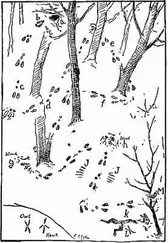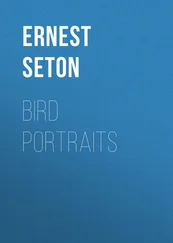Ernest Seton - Rolf in the Woods
Здесь есть возможность читать онлайн «Ernest Seton - Rolf in the Woods» весь текст электронной книги совершенно бесплатно (целиком полную версию без сокращений). В некоторых случаях можно слушать аудио, скачать через торрент в формате fb2 и присутствует краткое содержание. Год выпуска: 1997, Жанр: Приключения про индейцев, Исторические приключения, на английском языке. Описание произведения, (предисловие) а так же отзывы посетителей доступны на портале библиотеки ЛибКат.
- Название:Rolf in the Woods
- Автор:
- Жанр:
- Год:1997
- ISBN:нет данных
- Рейтинг книги:3 / 5. Голосов: 1
-
Избранное:Добавить в избранное
- Отзывы:
-
Ваша оценка:
- 60
- 1
- 2
- 3
- 4
- 5
Rolf in the Woods: краткое содержание, описание и аннотация
Предлагаем к чтению аннотацию, описание, краткое содержание или предисловие (зависит от того, что написал сам автор книги «Rolf in the Woods»). Если вы не нашли необходимую информацию о книге — напишите в комментариях, мы постараемся отыскать её.
Rolf in the Woods — читать онлайн бесплатно полную книгу (весь текст) целиком
Ниже представлен текст книги, разбитый по страницам. Система сохранения места последней прочитанной страницы, позволяет с удобством читать онлайн бесплатно книгу «Rolf in the Woods», без необходимости каждый раз заново искать на чём Вы остановились. Поставьте закладку, и сможете в любой момент перейти на страницу, на которой закончили чтение.
Интервал:
Закладка:
Judging from past experience of fox nature and from the few signs that were offered by the snow, this is what had happened: A fox came along soon after the trappers left, followed the track a little way, came to the first opening, smelled the seductive danger-lure, swung around it, saw the dangling feathers, took alarm, and went off. Another of the places had been visited by a marten. He had actually scratched in the ashes. A wolf had gone around another at a safe distance.
Another had been shunned several times by a fox or by foxes, but they had come again and again and at last yielded to the temptation to investigate the danger-smell; finally had rolled in it, evidently wallowing in an abandon of delight. So far, the plan was working there.
The next move was to set the six strong fox traps, each thoroughly smoked, and chained to a fifteen-pound block of wood.
Approaching the place carefully and using his blood-rubbed glove, Quonab set in each ash pile a trap. Under its face he put a wad of white rabbit fur. Next he buried all in the ashes, scattered a few bits of rabbit and a few drops of smell-charm, then dashed snow over the place, renewed the dangling feathers to lure the eye; and finally left the rest to the weather.
Rolf was keen to go the next day, but the old man said: "Wah! no good! no trap go first night; man smell too strong." The second day there was a snowfall, and the third morning Quonab said, "Now seem like good time."
The first trap was untouched, but there was clearly the track of a large fox within ten yards of it.
The second was gone. Quonab said, with surprise in his voice, "Deer!" Yes, truly, there was the record. A deer—a big one—had come wandering past; his keen nose soon apprised him of a strong, queer appeal near by. He had gone unsuspiciously toward it, sniffed and pawed the unaccountable and exciting nose medicine; then "snap!" and he had sprung a dozen feet, with that diabolic smell-thing hanging to his foot. Hop, hop, hop, the terrified deer had gone into a slashing windfall. Then the drag had caught on the logs, and, thanks to the hard and taper hoofs, the trap had slipped off and been left behind, while the deer had sought safer regions.
In the next trap they found a beautiful marten dead, killed at once by the clutch of steel. The last trap was gone, but the tracks and the marks told a tale that any one could read; a fox had been beguiled and had gone off, dragging the trap and log. Not far did they need to go; held in a thicket they found him, and Rolf prepared the mid-day meal while Quonab gathered the pelt. After removing the skin the Indian cut deep and carefully into the body of the fox and removed the bladder. Its contents sprinkled near each of the traps was good medicine, he said; a view that was evidently shared by Skookum.
More than once they saw the track of the big fox of the region, but never very near the snare. He was too clever to be fooled by smell-spells or kidney products, no matter how temptingly arrayed. The trappers did, indeed, capture three red foxes; but it was at cost of great labour. It was a venture that did not pay. The silver fox was there, but he took too good care of his precious hide. The slightest hint of a man being near was enough to treble his already double wariness. They would never have seen him near at hand, but for a stirring episode that told a tale of winter hardship.
Chapter 39.
The Humiliation of Skookum
If Skookum could have been interviewed by a newspaper man, he would doubtless have said: "I am a very remarkable dog. I can tree partridges. I'm death on porcupines. I am pretty good in a dog fight; never was licked in fact: but my really marvellous gift is my speed; I'm a terror to run."
Yes, he was very proud of his legs, and the foxes that came about in the winter nights gave him many opportunities of showing what he could do. Many times over he very nearly caught a fox. Skookum did not know that these wily ones were playing with him; but they were, and enjoyed it immensely.
The self-sufficient cur never found this out, and never lost a chance of nearly catching a fox. The men did not see those autumn chases because they were by night; but foxes hunt much by day in winter, perforce, and are often seen; and more than once they witnessed one of these farcical races.
And now the shining white furnished background for a much more important affair.
It was near sundown one day when a faint fox bark was heard out on the snow-covered ice of the lake.
"That's for me," Skookum seemed to think, and jumping up, with a very fierce growl, he trotted forth; the men looked first from the window. Out on the snow, sitting on his haunches, was their friend, the big, black silver fox.
Quonab reached for his gun and Rolf tried to call Skookum, but it was too late. He was out to catch that fox; their business was to look on and applaud. The fox sat on his haunches, grinning apparently, until Skookum dashed through the snow within twenty yards. Then, that shining, black fox loped gently away, his huge tail level out behind him, and Skookum, sure of success, raced up, within six or seven yards. A few more leaps now, and the victory would be won. But somehow he could not close that six or seven yard gap. No matter how he strained and leaped, the great black brush was just so far ahead. At first they had headed for the shore, but the fox wheeled back to the ice and up and down. Skookum felt it was because escape was hopeless, and he redoubled his effort. But all in vain. He was only wearing himself out, panting noisily now. The snow was deep enough to be a great disadvantage, more to dog than to fox, since weight counted as such a handicap. Unconsciously Skookum slowed up. The fox increased his headway; then audaciously turned around and sat down in the snow.
This was too much for the dog. He wasted about a lungful of air in an angry bark, and again went after the enemy. Again the chase was round and round, but very soon the dog was so wearied that he sat down, and now the black fox actually came back and barked at him.
It was maddening. Skookum's pride was touched.
He was in to win or break. His supreme effort brought him within five feet of that white-tipped brush. Then, strange to tell, the big black fox put forth his large reserve of speed, and making for the woods, left Skookum far behind. Why? The cause was clear. Quonab, after vainly watching for a chance to shoot, that would not endanger the dog, had, under cover, crept around the lake and now was awaiting in a thicket. But the fox's keen nose had warned him. He knew that the funny part was over, so ran for the woods and disappeared as a ball tossed up the snow behind him.
Poor Skookum's tongue was nearly a foot long as he walked meekly ashore. He looked depressed; his tail was depressed; so were his ears; but there was nothing to show whether he would have told that reporter that he "wasn't feeling up to his usual, to-day," or "Didn't you see me get the best of him?"
Chapter 40.
The Rarest of Pelts
They saw that silver fox three or four times during the winter, and once found that he had had the audacity to jump from a high snowdrift onto the storehouse and thence to the cabin roof, where he had feasted on some white rabbits kept there for deadfall baits. But all attempts to trap or shoot him were vain, and their acquaintance might have ended as it began, but for an accident.
It proved a winter of much snow. Heavy snow is the worst misfortune that can befall the wood folk in fur. It hides their food beyond reach, and it checks their movements so they can neither travel far in search of provender nor run fast to escape their enemies. Deep snow then means fetters, starvation, and death. There are two ways of meeting the problem: stilts and snowshoes. The second is far the better. The caribou, and the moose have stilts; the rabbit, the panther, and the lynx wear snowshoes. When there are three or four feet of soft snow, the lynx is king of all small beasts, and little in fear of the large ones. Man on his snowshoes has most wild four-foots at his mercy.
Читать дальшеИнтервал:
Закладка:
Похожие книги на «Rolf in the Woods»
Представляем Вашему вниманию похожие книги на «Rolf in the Woods» списком для выбора. Мы отобрали схожую по названию и смыслу литературу в надежде предоставить читателям больше вариантов отыскать новые, интересные, ещё непрочитанные произведения.
Обсуждение, отзывы о книге «Rolf in the Woods» и просто собственные мнения читателей. Оставьте ваши комментарии, напишите, что Вы думаете о произведении, его смысле или главных героях. Укажите что конкретно понравилось, а что нет, и почему Вы так считаете.




